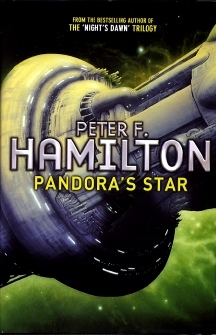The phrase "space travel" conjures up visions of rockets and
starships, tin cans in space with accommodations ranging from Spartan
to shamefully ornate. But there's another connotation, one rarely made;
"space travel" as a literary genre, that is, the travel literature
for an interstellar empire. For all the action, the intrigue, the mind-boggling
revelations and outstanding set-pieces, Peter F. Hamilton's 'Pandora's
Star' shines as well as a work of "space travel." He takes
you to planets and places you've never seen, and brings them to life
with fine writing and a variety of carefully planned and threaded plot-lines.
The very existence of the human race is at stake, and Hamilton makes
sure that we care about those human on a planetary, even neighborhood
scale.
In the very near future, as NASA Captain-Pilot Wilson Kime lands a rocket
on Mars, he's upstaged by Ozzie Isaacs and Nigel Sheldon, who create
a wormhole from the Earth to Mars. Some three hundred years later, humanity
has used the wormhole technology to colonize more than six hundred planets
and created an interstellar civilization, while extending the lives
of its citizens into the centuries. We've met some aliens and only seen
scant evidence of others, like the Starflyer. Paula Myo is a detective
who has been trying to ferret out a group of terrorists who claim the
Starflyer has infiltrated and is using humanity. Dudley Bose is a mildly
competent astronomer on the planet of Gralmond who happens to see something
impossible – a star disappears. The Commonwealth decides to investigate
and sends the first-ever starship, named the Second Chance, with Wilson
Kime at the helm, to investigate. The consequences are dire for all
but readers of rip-roaring, wide-screen space opera.
With 'Pandora's Star' and the sequel, 'Judas Unchained', Hamilton reprises
the breadth, style and bloat of his Night's Dawn trilogy. A huge cast
of memorable characters eke their way through normal lives and perilous
adventures on a variety of planetary landscapes. In all the splendor
of Hamilton's complicated universe, it's easy to miss how good he is
at creating characters and keeping them distinct enough so that we know
who's who, what they're doing and why. Paula Myo, Wilson Kime, Justine
Burnelli, Mellanie Rescorai, Ozzie Isaacs, and a host of lesser players
are wonderfully orchestrated and generally a lot of fun to be around.
The plots are as numerous as the characters, but just as easily followed.
Hamilton is writing on an enormous scale, so there's always a sort of
pleasant queasiness for the reader trying to keep track of everyone
doing everything everywhere. 'Pandora's Star' mixes a variety of genre
styles under one umbrella. The Paula Myo threads are mystery and espionage
thrillers, with a couple of scintillating set-pieces. Political maneuvering
plays a big role here, and occasionally these stories bog down just
a bit, even though there's great character work. Hamilton excels at
writing space adventures, and pulls more than a few wonderful science
fiction tricks out of his hat. Overall, everyone's in danger, pretty
much all the time. The fates of worlds hangs on the words and actions
of a very few, many of whom don’t realize their own import, at
least to begin with. Aliens prove to be grippingly and critically alien.
They offer Hamilton the chance to work in some pretty horrific scenarios
and well-wrought scenes of wonder. 'Pandora's Star' is a wormhole of
a novel, pulling the reader headlong from one place to another and slowly,
but not too slowly, letting the pieces add up to a big picture.
Hamilton writes all this plot and character with evocative and very
effective prose. The upshot is that we offered a compelling, tense and
occasionally terrifying travelogue through an indifferent but highly
entertaining universe. We go from the wine country planet to industrial
hell, to actual hell, to a Victorian idyll overwhelmed by science-fictional
war. Hamilton writes immersive scenic descriptions and creates planets
and scenes that combine the familiar and the unfamiliar to great advantage.
He's an ace mystery writer, and those plot threads are certainly among
the most enjoyable, especially as they play out against his vividly-described
backgrounds. Hamilton offers something a lot more satisfying that the
usual "roller-coaster" ride. It's the science fiction version
of an expensive cruise with lots of stops and lots of action.
Readers who start this book need to know that it's only half the story,
and that they’re likely to want the sequel, 'Judas Unchained'
at their side. 'Pandora's Star' lives up to its title and unleashes
a lot of pesky problems but leaves all of them unsolved at its conclusion.
And readers who begin this epic probably need the patience and taste
to read such a long work. But if Hamilton sets the bar high, he at least
lives up to his part of the bargain. 'Pandora's Star' creates a universe
full of problems – and the desire in readers to see everything,
to stop at every little house and tree, every star and starship, to
follow his characters from medieval squalor to futuristic splendor,
from the beginning of this series – to the end.
